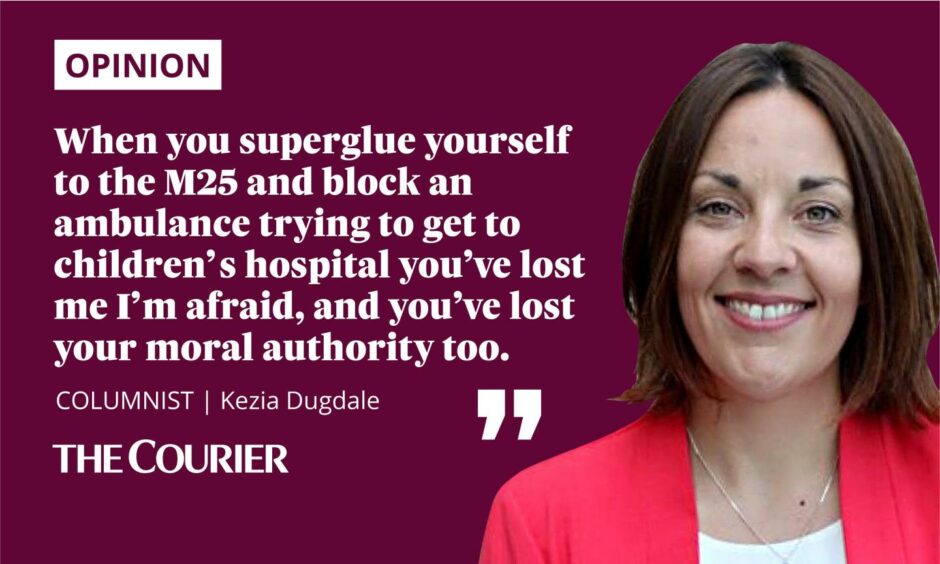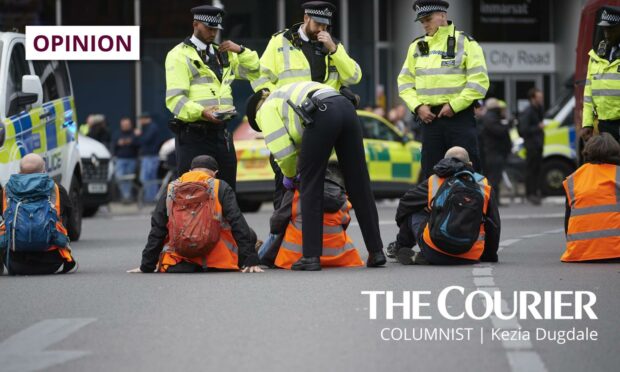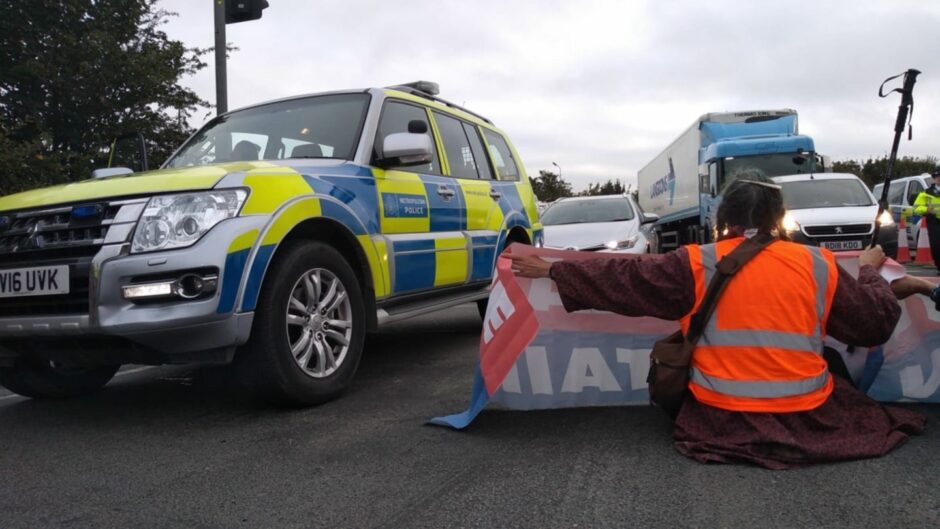I’ve felt a slight sense of dread since I set my mind to writing about climate protests this week.
I’m not often shy in sharing my views, but I can feel the online onslaught heading my way already.
It’s not that I don’t care about climate change. Of course I do.
The warming of the planet threatens civilisation as we know it.
If we don’t change our ways soon, sea levels will rise, ice caps will melt, severe weather trends will bring more dramatic flooding events and heat waves.
It’s serious and I get it. It’s just some of the climate change protesters I object to.

While taking a deep breath, let me say I also believe in the right of citizens to protest.
Of course I do.
It’s fundamental to a functioning democracy that we the people can assemble, march and demonstrate.
But when you superglue yourself to the M25 and block an ambulance trying to get to children’s hospital you’ve lost me I’m afraid, and you’ve lost your moral authority too.
This wasn’t just a one off.
There have been a series of incidents in recent weeks, all co-ordinated by the campaign group Insulate Britain, an offshoot of the Extinction Rebellion group.
Donate to support the #InsulateBritain campaign 👇👇https://t.co/ZstwDZbr1v https://t.co/Gwc0ZGizwt
— Insulate Britain (@InsulateLove) October 13, 2021
Similar protests are surely coming our way in the run up to COP26.
The organisers of the blockade were unrepentant in their comments to the press.
They say the protests are forcing the country to talk about climate change and the urgent need to insulate our housing stock.
Yes, that’s what we are all talking about in the pubs. Cavity wall insulation and pipe lagging.
Climate protests are counter-productive
I’m furious because their action isn’t working.
The UK Government’s response to these protests, wasn’t to up their ambition for the forthcoming climate change conference, it was to up the fine and minimum sentences for those breaking the law.
The pollsters YouGov reported that two thirds of the population think blocking a motorway hinders the cause of climate change.
More than half (55%) of people who say pollution, the environment and climate change is one of the top issues facing the country agree it is counter-productive.
Public opinion is not with the protesters, but it’s public opinion that needs to shift if we are to stem the tide of climate chaos.
That’s the problem with these extreme actions. When they are perceived as extreme by the public, so are the views they advocate.
You don’t need Swampy to tell you the world is warming and we’re all in danger if we don’t make better choices.
You need your bank manager, or some other middle of the road “just like you” person to be having those discussions.
People have more pressing anxieties
The biggest lesson I learned in politics, albeit far too late, is that you have to start with where the people are, rather than where you want them to be.
And right now people are worried.
As we rise out of the pandemic, I think we all feel a little more vulnerable than we did before.
For those on lower incomes, job security and the rising cost of food are occupying the mind.
Ensuring your child has a winter coat is the only insulation on the minds of most folk at the moment.
Families are watching their energy bills rise.
Energy bills could rise by hundreds of pounds https://t.co/PECJd1ABjq
— BBC News (UK) (@BBCNews) October 7, 2021
And insulation programmes are quite clearly a huge part of the long term answer, alongside reducing demand and securing cheap renewable energy sources.
But unless it is in by Christmas, it’s cold comfort for those fraught with worry today.
Telling those same people we’ll need to ditch gas boilers and petrol cars in the next five to 10 years is largely meaningless at the moment, even if it’s what we must do.
I want to see more brain power applied to the task of nudging the behaviour of people like me, who have the time and the income to make better climate choices today, while devising the policies that will protect those least able to carry the burden of climate inaction.
Better a carbon tax than superglue anarchy
One idea worthy of consideration is a carbon tax. It doesn’t need to be an additional tax, it could replace existing ones.
If you drive a diesel Range Rover and eat tomahawk steaks every night, maybe you can pay significantly more tax than someone living off their bus pass and roasted cauliflower.
Tax systems change behaviour, super glue anarchism does not.
There are huge expectations on global leaders heading into COP26.
The decisions they take in Glasgow represent the last real chance we really have to stop and even reverse the damage we’ve done to our planet.
They may disappoint us, they so often do, but I hope at the end of it all we’re discussing the decisions of our democratic leaders, rather than the counter productive antics of these protesters.











